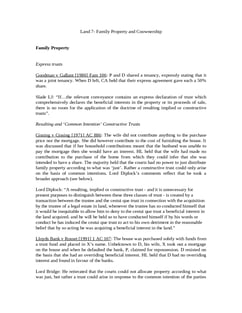Warnborough v Garmite [2003] EWCA Civ 1544
Judgement for the case Warnborough v Garmite
Table Of Contents
KEY POINTS
Equity of redemption ensures that borrowers, even after defaulting on mortgage payments, retain the right to reclaim ownership of pledged property by settling the outstanding debt.
It balances lenders' rights and fair treatment for borrowers, preventing immediate foreclosure and allowing for financial rectification.
-
Mortgages are secured loans that facilitate property transactions.
They enable individuals to purchase real estate by spreading the cost over time. Lenders offer predetermined interest rates and terms, with the property as collateral.
Timely payments by the borrower maintain good credit, while the lender's security lies in the property, subject to foreclosure in case of default.
-
Options to buy, or call options, grant the right (but not obligation) to purchase a specified asset.
They are commonly used in real estate transactions.
In property transactions, this option gives a buyer exclusive right to purchase at an agreed-upon price within a defined period, providing flexibility and a strategic advantage in real estate deals.
FACTS
The dispute centered on the validity of two options for purchasing real property. Parties involved were Wanrnborough Ltd (“Appellant”) and Garnite Ltd (“Respondent”).
The options, granted alongside the sale of property by Wanrnborough Ltd to Garnite Ltd, had the purchase price remaining as an outstanding loan secured on the property.
The Court of Appeal, citing precedents like Samuel v Jarrah and Davies v Chamberlain, highlighted the need to scrutinise the transaction's substance.
-
Jonathan Parker L.J. acknowledged the vague origin of the "clog on the equity of redemption" principle but refrained from establishing a rigid rule.
The court suggested that sales involving outstanding mortgages were likely to be viewed as a sale and purchase.
The validity of the first option awaited trial, and the second option's enforceability depended on the outcome of the first.
The Court of Appeal allowed the appeal, indicating a need for a more comprehensive examination during the trial.
JUDGEMENT
The court concluded that the Appellant had a finding that the options to purchase real property were void.
-
The Court of Appeal, particularly Jonathan Parker L.J., discussed the historical context and principles related to options to purchase mortgaged property.
The judge emphasised the importance of examining the substance of the transaction and suggested that when there is a sale of the property with the price left outstanding as a mortgage, there must be a strong likelihood that the court will conclude the transaction is one of sale and purchase, not a mortgage.
The appeal was allowed, as the Court of Appeal disagreed with the initial finding that the options were void.
COMMENTARY
-
The case outlines the significance of equity of redemption, mortgages, and options to buy in real estate transactions.
It emphasises the balance between borrower and lender rights in equity of redemption, succinctly describes mortgages as secured loans with potential foreclosure, and introduces options to buy as strategic tools in real estate dealings.
-
The second part briefly details a legal dispute between Wanrnborough Ltd and Garnite Ltd, focusing on the validity of two property purchase options.
The Court of Appeal's role in assessing transaction substances, citing legal precedents, is highlighted.
The case concludes by stating that the Court of Appeal disagreed with the initial finding that the options were void, stressing the need for a more thorough examination during trial.
ORIGINAL ANALYSIS
Defendant mortgaged his property to Plaintiff, granting him options to purchase the mortgaged property.
The CA felt bound by the precedent so that the “unruly dog” of the collateral advantage rule was still alive.
However CA allowed the options to stand, since when there is a sale of the property (for a price which is left to be outstanding on mortgage) by the grantee of the option, then “… there must be a very strong likelihood that, on an examination of all the circumstance, the court will conclude … that the substance of the transaction is one of sale and purchase and not one of mortgage”. (Per Jonathan Parker LJ).
The validity of some collateral advantages may also be affected by the doctrine of restraint of trade: see Esso v Harper’s Garage [1968] AC 269: Two mortgages were in issue, one with a solus agreement for exclusively buying petrol from the mortgagee for 5 years, and the other for 21 years.
The first tie was upheld by HL but not the second. This was not on the basis of clogs on redemption, but on the basis on restraint of trade (common law, not equity). This approach commended itself to Diplock LJ in CA, who said that this common law doctrine was surer than the equitable doctrine of clogs to redemption.
HL determined unfair restraint of trade on the circumstances of the individual case, which Lord Hodson preferred to consider in terms of its effect on the public rather than the contracting individuals, given the widespread economic effect of the subject matter (petrol).
RELATED CASES
For Further Study on Warnborough v Garmite
Need instant answers? Our AI exam tutor is here to help.
Ask questions 🙋 Get answers 📔 It's simple 👁️👄👁️
Our AI is educated by the highest scoring students across all subjects and schools. Join hundreds of your peers today.
Get StartedSimilar Cases
Related Product Samples
These product samples contain the same concepts we cover in this case.

